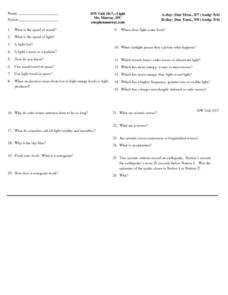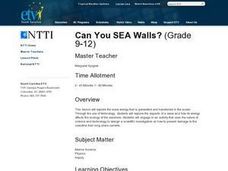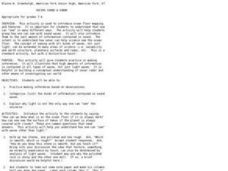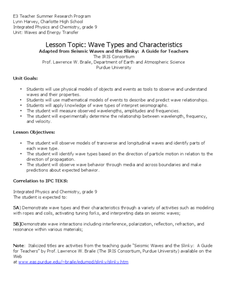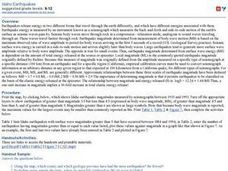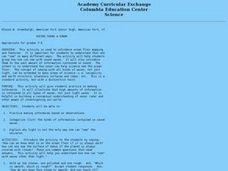Curated OER
Making Waves: A Study of Earthquakes and Tsunami
Students examine plate tectonics and the causative effect of earthquakes. In this tectonics lesson students differentiate between the types of energy waves that cause earthquakes and tsunamis and how waves travel at different...
Science Matters
Finding the Epicenter
The epicenter is the point on the ground above the initial point of rupture. The 10th lesson in a series of 20 encourages scholars to learn to triangulate the epicenter of an earthquake based on the arrival times of p waves and s...
Curated OER
What are Earthquakes?
Here is a scientific presentation of earthquakes. The elastic rebound theory is explained, as well as the different types of waves and how they are measured. Just a note: Slide number 15 has a diagram that is upside down. Enable editing...
Curated OER
Slinky Lab- Simulating the Motion of Earthquake Waves
Sixth graders simulate primary and secondary waves. In this earthquakes waves activity, 6th graders experiment using a slinky to gain understanding of how waves are created during an earthquake. Students record observations in drawings....
Mr. E. Science
Plate Tectonics
Get a detailed look at plate tectonics with a 14-slide presentation that highlights the Earth's layers, continental drift, seafloor spreading, the theory of plate tectonics, and boundary types. Each slide provides thorough...
Curated OER
HW Unit 10:7-Light
In this light worksheet, students answer twenty six questions about sound and light and how they both travel. They also answer questions about different types of waves in the electromagnetic spectrum such as radio waves, visible light,...
Curated OER
Name That Tune
Young scholars complete a fingerprint oil lab in order to simulate how geologists use the oil and natural gas in rocks to hear sound waves that signify there are oil in those rocks. In this rocks lesson plan, students learn that the rock...
Curated OER
Can You SEA Walls?
Students explore how wave energy that is generated and transferred in the ocean. They explore the aspects of a wave and how its energy affects the ecology of the seashore. Students engage in an activity that uses the nature of science...
Curated OER
Seeing Sound & Sonar
Students make inferences based on different sounds that they hear. In this inferences lesson plan, students will hear sounds of different objects and describe the sounds based on what they hear. They will answer various questions about...
Curated OER
Wave Types and Characteristics
Ninth graders identify the different parts of a wave. In this physics lesson plan, 9th graders observe wave behavior as it travels through a boundary. They determine the relationship between wavelength, frequency and velocity.
Mr. E. Science
Earthquakes
Learn about the causes of earthquakes, as well as the value of seismographs, with an informative presentation. From the Richter Scale to the Mecalli Scale, learners discover elements that make an earthquake occur.
Science Matters
Earthquakes and Volcanoes Post Assessment
The final lesson in the 20-part series is a post assessment covering earthquakes and volcanoes. Twenty-three questions incorporate each of the previous lessons through multiple choice, justified multiple choice, expanded multiple choice,...
Curated OER
Forces in Earth
In this Earth's forces worksheet, students will review the characteristics of earthquakes, including types of faults. Students will interpret a seismograph read-out from an earthquake. Students will complete 10 fill in the blank...
LABScI
Acoustics: The Sound Lab
If the delay between a sound and its echo is less than 1/10th of a second, the human ear can’t distinguish it. Through the use of a Slinky, rubber band guitar, and straws, scholars explore where sound comes from and how it travels....
Curated OER
Does that Sound Right to You?
Ninth graders are introduced to the components of compressional and transverse. They practice answering speed problems involving different mediums that waves travel trhough and then review the wave PowerPoint. They then visit physics...
Curated OER
Plate Tectonics: Fifth Grade Lesson Plans and Activities
Fifth graders continue their investigation of the plate tectonics cycle with an exploration of the movement of Earth's crust. During the lab, young geologists conduct an experiment to discover the result of different types of...
Curated OER
Plate Tectonics: Third Grade Lesson Plans and Activities
Third graders examine plate movements and boundaries with a lab that demonstrates how volcanoes and earthquakes are formed. It presents different types of stresses an object can withstand through a hands-on...
Curated OER
Earthquakes: Kindergarten Lesson Plans and Activities
Beginning with a pre-lab, kindergarteners trace the letters in the word earthquake and discuss what happens in an earthquake. The lab portion allows young scientists realize that earthquakes trigger shaking of different intensities...
Curated OER
Electromagnetic Spectrum
Students define electromagnetic radiation, list major categories and uses of electromagnetic waves, identify potential health risks with electromagnetic waves, and demonstrate understanding of Plank's constant by solving quantitative...
Curated OER
Plate Tectonics: Fourth Grade Lesson Plans and Activities
The pre-lab portion of the lesson introduces emerging geologists to the various layers that make up Earth. After completing a sheet on the identification of the layers, class members simulate plate boundaries and their...
Curated OER
Idaho Earthquakes
Students examine the types of earthquakes that occur in Idaho. In groups, they compare and contrast the types of energy released and how they affect the movement of the Earth. To end the activity, they analyze a map showing the...
Curated OER
Motions
Ninth graders differentiate between energy waves transmitted from a quarry or mine as opposed to energy waves transmitted by an earthquake. They analyze seismograms of blast events from at least two quarries or mines. The energy waves...
Curated OER
Seeing Sound and Sonar
Students grasp how underwater animals can "see" using sound waves. They practice making inferences, and build a conceptual understanding of sonar radar.
Curated OER
Earthquakes: Second Grade Lesson Plans and Activities
What causes earthquakes? Second graders learn about stresses from plate movement with a set of hands-on activities. After tracing fault lines on a map with yarn, class members create a paper plate model of Earth to show its layers...







